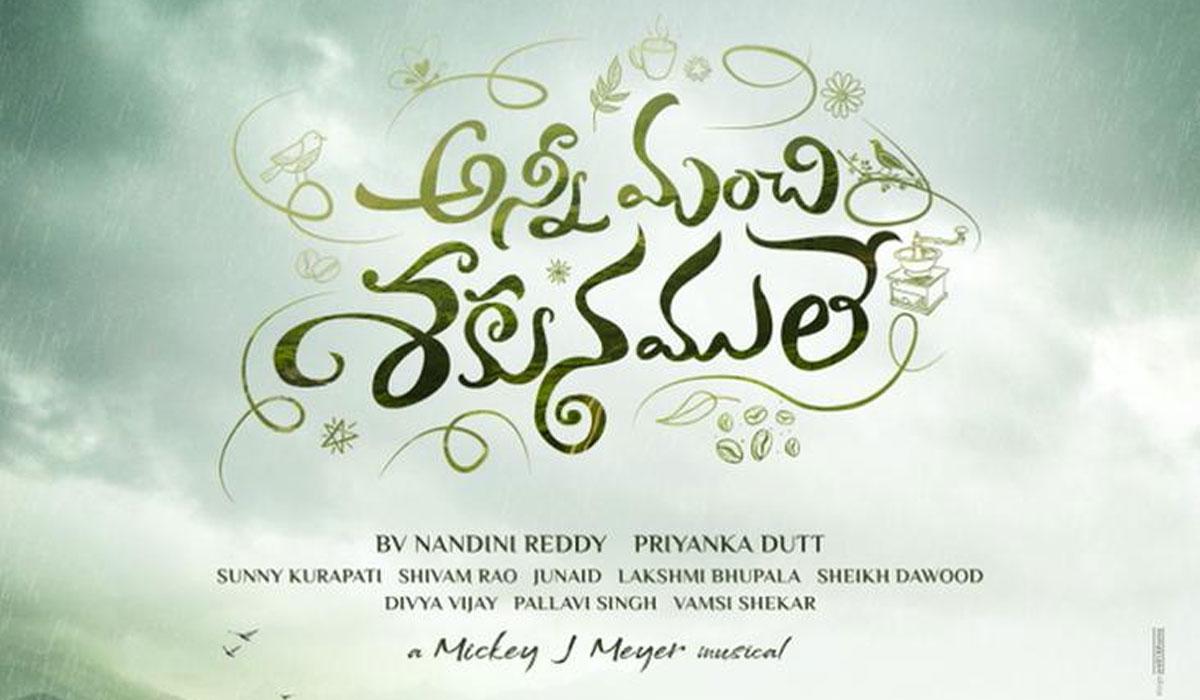Cast – Santosh Shobhan, Malavika Nair, Rajendra Prasad, Vennela Kishore, others
Director – Nandini Reddy
Producer – Priyanka Dutt
Banner – Vyjayanthi Movies
Music – Mickey J Meyer
Anni Manchi Sakunamule, the latest offering from the creators of Mahanati, Jathi Ratnalu, and Seeta Ramam, has undoubtedly heightened expectations. The film’s distinctive promotional strategies have further contributed to the anticipation and excitement surrounding it. Now, it’s time to explore whether Santosh Sobhan can break the spell and if Nandini Reddy can replicate the success of Oh Baby!. Let’s delve into what worked and what didn’t in this regard.
Story:
Anni Manchi Sakunamule takes place in the captivating town of Victoriapuram, which derives its name from Queen Victoria’s historical association with coffee. The story follows Rishi (Santosh Sobhan) and Arya (Malvika Nair), childhood sweethearts who become separated due to an enduring legal conflict between their families regarding a coffee estate.
While Rishi exudes a carefree and jovial attitude, Arya shoulders various responsibilities and faces looming deadlines. The film explores their journey of falling in love, the obstacles that come between them, and their efforts to resolve the deep-rooted feud between their families.
Additionally, it uncovers the mysterious connection between Rishi and Arya’s family and the significant ties that bind Arya to Rishi’s family. Anni Manchi Sakunamule revolves around these intricate relationships and their impact on the protagonists’ lives.
Performances:
Santosh Sobhan delivers a nuanced performance as Rishi, portraying a character with peculiar traits. On the surface, he appears unconcerned about others, but deep down, he genuinely cares for the people around him and their problems. Despite being an “average” guy, he manages to be intriguing and serves as a troubleshooter in various situations.
Malvika Nair shines in the author-backed role of Arya, whose characterization revolves around financial planning and assuming her family responsibilities, setting her apart.
Rajendra Prasad portrays a determined character who strives to win the legal case regarding the ownership of the coffee estate, upholding the promise he made to his father.
Rao Ramesh’s portrayal of Diwakar stands out with his notable performance, particularly during an emotionally charged moment in the film.
Naresh does justice to his character as a doctor and a compassionate Samaritan who assists those in need. His friendly rapport with his daughter is highlighted by their shared moments of drinking beer together. Sowcar Janaki’s role brings a refreshing touch to the film.
However, Vasuki’s role feels like mere filler, and her potential remains untapped. Vennela Kishore’s character fails to elicit laughter as intended. Gauthami delivers emotionally impactful moments and showcases her dancing skills in a wedding sequence.
The presence of numerous other characters in the film, who come and go, can be slightly confusing. Nevertheless, the lead characters’ performances carry the movie effectively, shouldering its overall impact.
Positives:
Feel-good moments
Last 20 minutes
Cast and production values
Drawbacks:
Slow narration
Flat Screenplay
Analysis:
The storyline of Anni Manchi Sakunamule is straightforward and unadorned. Writer-director Nandini Reddy heavily relies on family emotions and drama, but unfortunately, the film falls short in executing these elements convincingly. Artificial feelings and forced drama hinder the overall viewing experience and fail to engage the audience. The scenes lack freshness and fail to leave a lasting impact. Some nostalgic moments throughout the film draw comparisons to Allu Arjun and Trivikram’s Ala Vaikunthapurramuloo, although the conflict in Anni Manchi Sakunamule revolves around a family feud.
The first half of the film feels flat and consists of many time-pass scenes. The friction between Rishi and Arya in the pre-interval sequence fails to deliver the expected impact. Even the moment where Arya realizes Rishi’s love in the latter half feels clichéd and lacks originality, as it has been seen in numerous old films.
The romance between the lead pair is missing, leaving a void in the storytelling. The constant references to the legal battle for the coffee estate remain vague, as the filmmaker doesn’t provide a clear explanation of the conflict. The success of Arya and Rishi in their careers lacks convincing development, as it is merely mentioned without delving into the specifics. Nandini Reddy takes cinematic liberties that strain believability. The film offers potential for further exploration and enhancement, but unfortunately falls short of expectations.
The screenplay lacks twist or surprise elements, following a predictable and familiar path that leaves little room for audience engagement. The slow-paced narration tests the audience’s patience, lacking the magic and charm found in Nandini Reddy’s earlier work, Ala Modalaindi.
However, the film manages to salvage itself with its soulful and honest approach. The feel-good factor appeals to viewers, and the competent cast and solid production values enhance the overall experience. The final twenty minutes of the film serve as a saving grace, with the emotional breakdown of Rao Ramesh at a crucial juncture making a notable difference. However, it raises the question of whether one good sequence is enough to redeem an entire film, and opinions on this may vary among individual viewers. Anni Manchi Sakunamule may not appeal to everyone, as it caters specifically to a subset of “class” audiences who appreciate family emotions and melodrama.
Verdict:
Nandini Reddy’s writing style often leans towards simplicity, but it tends to incorporate a surplus of characters. While her reliance on emotion and drama occasionally pays off, the slow-paced narration can make the overall experience a bit dull. Nevertheless, the visuals are visually appealing, resembling eye-candy, and the music by Mickey J Meyer adds a touch of enchantment. It is worth noting the commendable production values in this film.
